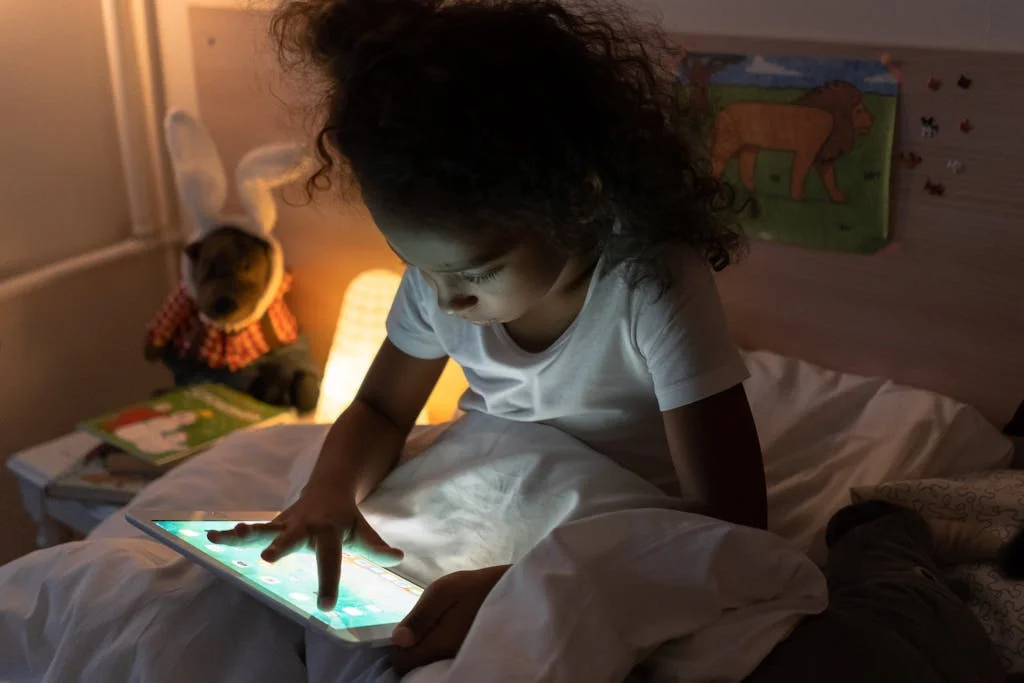Stakeholders raise concern over parents influence on children screen habits

Stakeholders at an intentional parenting webinar have noted with concern influence that parents have in shaping certain habits in children and wards including screen habits.
Experts and parents at the conference on intentional parenting came to a conclusion that parents have larger role to play than school teachers in limiting screen times on television,laptop, iPad and phones.
The platform was provided at the second edition of the Intentional Parenting Program organized by News Balance Media and Communication , in partnership with Vaccine Network for Disease Control and Health Communication and Visibility.
It was agreed that excessive exposure to screen times lead to.huge distraction to learning at school and being responsive at home, hence the consensus opinion that there is the need for strategies that foster resilience and confidence in today’s children.
Convener of the program, Bukola Afeni, said intentional parenting is vital in shaping the moral fabric of society.
“Intentional parenting is crucial in molding the next generation of leaders, thinkers, and citizens.
“By instilling positive values and morals, parents can significantly influence the trajectory of their children’s lives and, by extension, the future of society,” she said.
Afeni explained that the program seeks to empower parents and guardians with the skills and knowledge necessary to raise responsible children who will contribute positively to society.
Blessing Opum, a child development specialist, highlighted that in Nigeria, busy parents often unintentionally encourage prolonged screen use.
“Many parents are constantly working, even from home, and when children seek attention, they are often directed toward screens. This may seem harmless, but research shows that excessive screen time can delay brain development and reduce cognitive skills,” Opum said.
She added that even educational content, such as rhymes or learning videos on letters and numbers, can be excessive if children spend too much time in front of screens.
“Parents often think, ‘They are learning,’ but the reality is that overexposure can still negatively impact their development,” Opum explained.
Epum stressed the importance of parents and teachers working together to regulate children’s daily screen time.
According to Epum, excessive screen time poses a great danger to the children, noting that children now feel bored without screen
“As a teacher, even though you have TVs or you have screens and whiteboards and all of those kind of gadgets in your classrooms, and yeah, it’s good for us to use videos to teach them, multimedia mode of teaching.
“However, there should be a caution to that. There should be a time limit. It should be time bound.”
Founder and CEO of the Vaccine Network for Disease Control, Chika Offor, emphasized the need for collaboration among civil society organizations (CSOs) and non-governmental organizations (NGOs) to enhance child development initiatives.
Offor further urged NGOs to examine existing policies:
“The positive aspect is that there is so much we can achieve together as CSOs and NGOs. We need to ask, are there policies on parenting or child health? Do they need amendments? When were they last reviewed? These are the questions NGOs should be exploring.”
Speaking on the role of NGOs in parenting and child education, Offor highlighted that many organizations work in silos, limiting the impact of their efforts.
She stressed the importance of pooling knowledge and best practices into a unified framework that can be accessed and utilized by others.
“Collaboration is key,” Offor said. “CSOs and NGOs must come together, share their expertise, and build the capacity of others, especially in areas like parenting, education, and child health.”
Speaking on Emotional Presence, and Active Listening in Child Upbringing, Tunde Ajileye, a former manager at Sheraton hotel and a pastor, said many children today struggle with low self-esteem because their parents focus more on correction than affirmation.
According to him, while traditional discipline teaches values like patience, excessive rigidity without empathy often makes children feel unloved and pushes them to seek comfort elsewhere.
“A parent must be able to strike a balance,” Ajileye noted. “If you turn to the extreme on both sides, you will be missing it. Parents must have the necessary emotional intelligence to put themselves in their children’s shoes and ask: What is this person feeling? What is the likely effect of my actions?”
He stressed that parents must remain informed about social and technological changes, including artificial intelligence, because children are already exposed to such trends outside the home.
On the role of fathers in ensuring emotional stability, Ajileye explained that earning a child’s trust and respect is critical. He warned that when fathers fail to set moral and social boundaries early, children become more vulnerable to peer pressure, drug abuse, and negative influences.
“Parenting goes beyond biology,” he said. “It requires sacrifice from both father and mother. Children watch how you treat them. There is a difference between discipline and punishment. If you don’t apply emotional intelligence, your children will fear you instead of warming up to you.”










